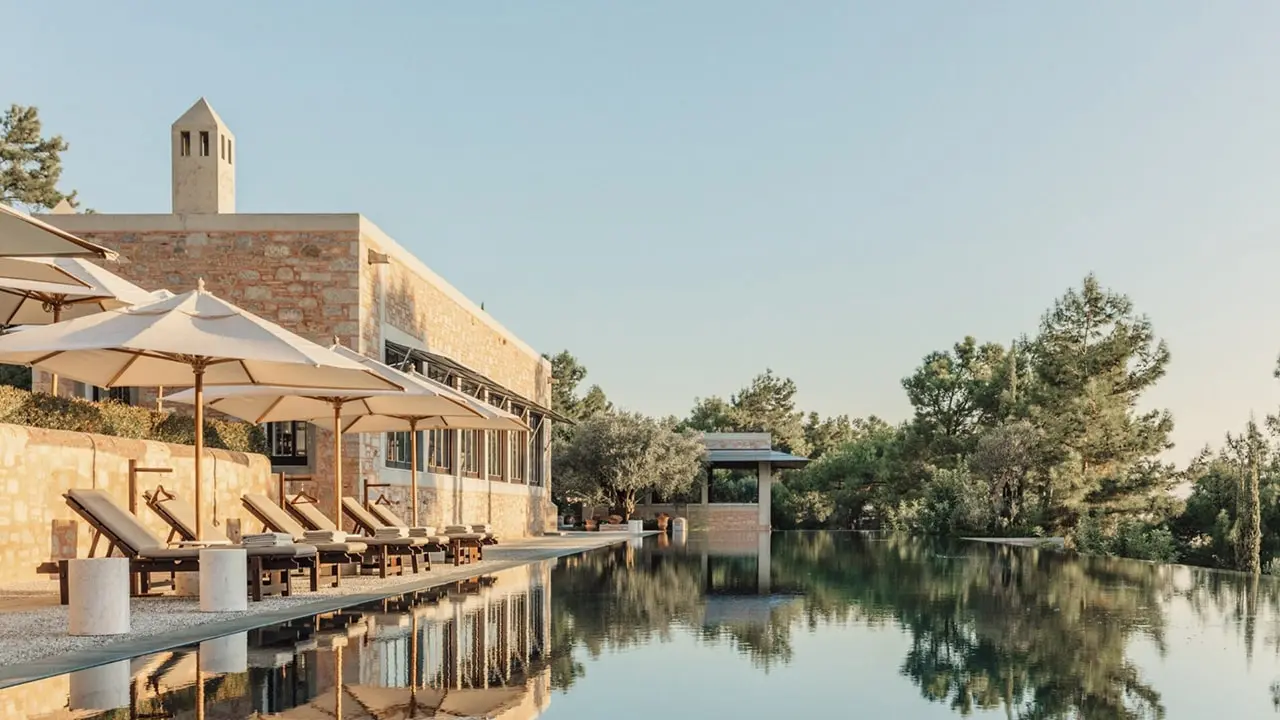
BLG Capital recently sold the Amanruya Bodrum on Turkey’s southeast Mediterranean coast for about $75 million, equivalent to approximately $2.1 million per key. (BLG Capital)
In March, Istanbul-based BLG Capital finalized the sale of the Amanruya Bodrum in Turkey to an unnamed Turkish asset-management firm for approximately $75 million, or $2.1 million per key. Located on the Mediterranean coast in eastern Turkey, the resort has 36 free-standing villas, all with private pools.
BLG Capital managing director Giray Boran told Hotel News Now the price per key of the Amanruya Bodrum sale is notable for any European and Middle Eastern market. He added the transaction represented the highest price per room and yield ever achieved in Turkey.
He said the property posted a revenue growth of 80% in the last two years, reaching an average daily rate of $2,000 and above a 50% margin.
BLG bought the Amanruya Bodrum in 2015 and reopened it in 2018 following restructuring. At the time of purchase, the hotel was operating at a loss, but since Boran and his team took over management, it broke even in its first year of operation and saw a small profit in the second, he said.
Even at the highest end of the luxury segment, there is room to add capital expenditure and to better asset-manage properties, Boran said. The property’s earnings before interest, taxes, depreciation and amortization exceeded $3 million in 2023.
“Now, gross operating profit levels are up due to our asset management, and the hotel is one of the best Aman properties worldwide. It is one of the most spectacular hotels we have owned,” he said.
The resort has also benefited from a market eager for high-end hotel stays. Before the sale of the Amanruya Bodrum, Boran said BLG Capital continued to invest in the property instead of rolling back amenities to cut costs.
“We changed our marketing and revenue strategies and added more guest experiences such as wellness, private tours and [food and beverage], including Michelin-starred chefs. Yes, margins remain very important, but of most importance is to be top of the line, and we will not diminish the experience for short-term margins because that is not a sustainable long-term strategy,” he said.
The 2015 acquisition of the resort was part of BLG Capital’s second fund, and it was always the firm’s intention to exit in five to eight years, Boran said.
“We waited a little more due to the pandemic, but the sale represents a great multiple,” he said.
More Markets and More Asset Classes
BLG Capital is looking to expand its hotel ownership outside of its Turkish and American core markets, as well as continue to own both hotels and high-end residential developments, often hotel-branded ones.
The firm also owns an office in New York City, at 530 Broadway.
BLG Capital’s hotel portfolio includes Turkish and U.S. assets, such as Turkey’s first Peninsula and W hotels, the Soho House Istanbul, the Aman New York, the Rosewood The Raleigh Miami Beach and Mandarin Oriental Residences in Beverly Hills, California, and New York City.
The firm also has ownership interests in office, retail, mixed-use and student-accommodation real estate assets in Turkey, the U.S. and Europe.
Although Turkey and the U.S. are the company’s main markets, BLG Capital has two pipeline projects in the works to expand its presence in Europe, including hotels and other real estate classes, Boran said. Opening a European office to explore deals in western and southern Europe is also on Boran’s wish list.
“There are potential hospitality projects in Tuscany, the Italian Mediterranean coast and in major Italian cities. We hope to announce developments soon,” he said.
The U.S. office, now open for approximately 10 years, is monitoring potential deals in Miami, New York City and Los Angeles in collaboration with Italian developer Bizzi & Partners.
Boran said BLG executives have always liked to have a mix of hotel and residential ownership because of the appealing returns for developers and investors. He emphasized that scale is important moving into a new market from the viewpoint of relationships and costs.
The highest growth rates are in Miami and Dubai, which are above 100%, he said. But the strong brand associations that individuals form can be incredibly influential in driving decisions to purchase branded residences.
He said that while BLG’s future would continue to focus on branded, luxury and lifestyle hotels and residencies, other property niches such as non-performing loans, multifamily and senior housing also are under consideration.
Beyond the possibility of opening an office in Europe, Boran said BLG Capital is even mulling an additional office in the Middle East, where institutional investors have expressed interest in the firm’s investment model.
Prioritizing Sustainability Initiatives
BLG Capital has an ambitious plan to reduce greenhouse-gas emissions by 40% until 2030, by 70% until 2035 and then completely by 2040, Boran said.
The company is working toward having all carbon-neutral properties by 2030, monitoring water consumption, and planning to divert 75% of construction and demolition waste from landfills by 2030.
Boran said the firm has implemented renewable energy solutions across its portfolio, with the goal to have 80% of its portfolio powered by renewable sources by 2030.
Galataport Istanbul, which includes BLG Capital’s Peninsula Istanbul hotel, is a landmark project covering more than 4 million square feet of development, and an important test of BLG’s sustainability initiatives, he said.
It is the largest project in Europe to receive LEED Platinum rating, Boran added, and this has spurred BLG to achieve LEED Platinum certification for all its existing and newly developed projects.

































